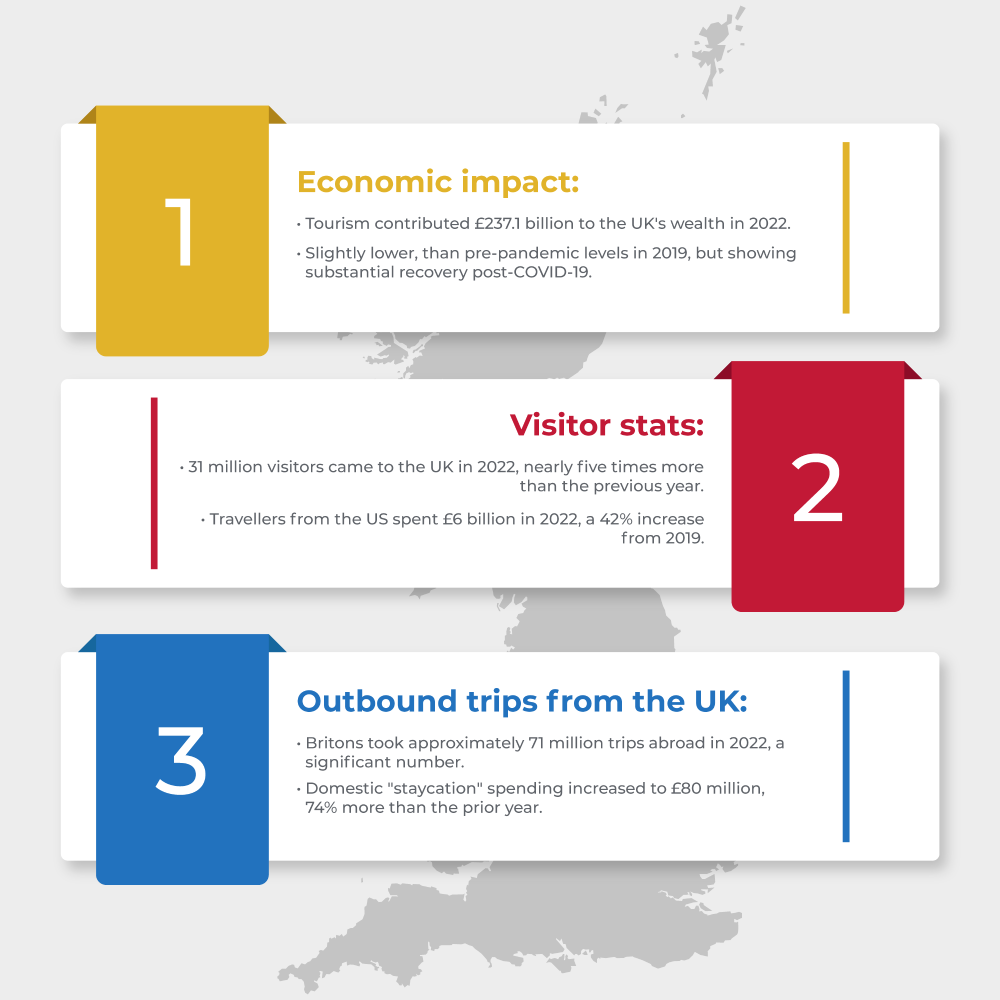
How can you develop entrepreneurship in tourism?
In the society we live in, many people love to travel and seek new adventures. If you're someone who enjoys exploring and meeting new people, a career in tourism entrepreneurship could be exciting for you. Nowadays, with social media, people are always looking for fresh and unique experiences to share online.
In the UK, tourism is a big part of the economy. In 2022, it added around 237.1 billion British pounds to the country's wealth. This was a bit less than before the pandemic in 2019, but it showed a good early recovery from the tough times of COVID-19.
In the bustling world of travel and discovering new places, there are people who are really good at creating new ideas and businesses in tourism that become highly valuable. They're the tourism entrepreneurs, managers and creators who create amazing experiences for travellers and help the tourism industry grow. But what exactly is tourism entrepreneurship?
What is tourism entrepreneurship?
Tourism entrepreneurship refers to people or businesses coming up with different ideas for tourism, like fun activities to do, places to stay and ways to get around. It's important for making the whole tourism industry grow.
Tourism entrepreneurship is about solving problems in society, facilitating a country’s fiscal growth and development and helping improve its GDP. Entrepreneurship is all about developing an idea for a business and launching it. In tourism, it means making new businesses that leverage innovative solutions and technologies to meet the expectations of today’s travellers.
In 2022, there were about 31 million visitors to the UK, which is almost five times more than the year before. With lots of people coming in from all over the world, there was also a lot more money spent. For example, travellers from the United States spent about six billion pounds in 2022, which is 42 percent more than in 2019.
But when it comes to people from the UK going out for trips, it's even higher — around 71 million trips were taken in 2022. And for Britons who holidayed at home, otherwise known as taking a “staycation”, they spent about 80 million pounds on local trips, which is 74 percent more than the year before.
Table of Contents
- What is tourism entrepreneurship?
- What is sustainable tourism in business?
- Types of tourism entrepreneurship
- Characteristics of entrepreneurship in tourism
- Role of entrepreneurship in tourism in economic development
- Study business and tourism management with Global Banking School (GBS)
- Frequently asked questions about entrepreneurship in tourism

Tourism entrepreneurship is distinguished because it identifies untapped potential and capitalises on the latest trends. Successful entrepreneurs concentrate on innovation, offering unique services, using new technology and creating experiences that visitors will always remember. They follow trends like farm-to-table food and eco-friendly activities to show tourists local culture and encourage sustainable practices.
Sustainability is all about taking care of the environment, local culture and communities. All of these are key parts of entrepreneurship in tourism. For example, a wildlife sanctuary that teaches people about animals and provides them with safe shelter helps the environment and also helps the local area by boosting the local economy.
What is sustainable tourism in business?

Sustainable tourism means using sustainable practices across the tourism industry. It's about acknowledging all the positive and negative impacts of tourism and trying to make sure the negative aspects are as minimal as possible.
- The negative impacts on a destination include revenue going out of the local area (economic leakage), harm to nature and overcrowding, to name a few.
- But positive impacts on a destination can create jobs, help preserve cultural heritage and interpretation, wildlife, encourage beautification and more.
The United Nations (UN) programme and the UN World Tourism Organisation define sustainable tourism as a “tourism that takes full account of its current and future economic, social and environmental impacts, addressing the needs of visitors, the industry, the environment and host communities.”
The goal of sustainable tourism is to increase the benefits and curb the negative impacts caused by tourism. This can be achieved by:
- protecting nature, animals and natural resources when we develop and manage tourist activities.
- ensuring tourists get real experiences that respect and conserve local culture and history.
- helping communities by giving them employment opportunities.
Types of tourism entrepreneurship
Entrepreneurship in tourism is a complex and multifaceted phenomenon that includes a wide range of business activities and strategies in tourism. Let's talk about some common types of tourism entrepreneurship in the table below:
| Type of tourism entrepreneurship | Description | |
| 1. | Accommodation and hospitality tourism entrepreneurship |
|
| 2. | Food and beverage tourism entrepreneurship |
|
| 3. | Adventure and outdoor recreation tourism entrepreneurship |
|
| 4. | Cultural and heritage tourism entrepreneurship |
|
| 5. | Sustainable and ecotourism entrepreneurship |
|
| 6. | Specialised and niche tourism entrepreneurship |
|
Characteristics of entrepreneurship in tourism
Entrepreneurship in tourism needs various skills and a different way of thinking. These qualities are important in an industry where being creative, strong and focused on customers is crucial. Entrepreneurs who start businesses in tourism create new ideas while facing risks and difficulties that are part of this active world. Let's explore the main traits that can make you successful in starting businesses in the busy world of tourism.
- Creativity and innovation: Being creative and innovative to craft unique tourism experiences that stand out in the market.
- Risk-taking and resilience: Having the courage to take risks and bounce back from setbacks in the face of unexpected challenges.
- Vision and strategic thinking: Developing a clear vision and strategic plan for the business based on market trends and customer feedback.
- Opportunity recognition and exploitation: Identifying market opportunities and adapting business models to capitalise on emerging trends.
- Customer orientation and market responsiveness: Being customer-centric and responsive to market demands to build loyal customer bases.
- Resourcefulness and adaptability: Finding creative solutions and being adaptable in managing unexpected situations.
- Networking and collaboration: Building partnerships and networks to access resources and opportunities in the industry.
- Passion and commitment: Having a strong dedication and enthusiasm for the business and its goals.
- Financial and business acumen: Understanding finance and business management to make sound decisions for profitability.
- Leadership and team building: Being an effective leader and fostering a positive work environment to guide team members.
- Social and environmental responsibility: Being aware of and responding to social and environmental impacts by adopting sustainable practices.
- Continuous learning and improvement: Engaging in lifelong learning and adapting to market trends for enhanced competitiveness and growth.
Role of entrepreneurship in tourism in economic development
Tourism entrepreneurship plays an important role in the economic development of countries by creating jobs, generating revenue, bringing in foreign exchange earnings and growing the tourism industry as a whole.
| Key economic contributions of entrepreneurship in tourism: | ||
| 1. | Job creation | Entrepreneurship in tourism opens job opportunities in various sectors like accommodation, transportation, food and entertainment. It's a major global employer, especially in rural areas. |
| 2. | Income generation | Entrepreneurs, employees and governments benefit financially. Entrepreneurs sell goods/services, employees earn and governments earn taxes and fees. |
| 3. | Foreign exchange earnings | Attracting foreign tourists generates foreign currency, aiding a country's balance of payments, especially in developing nations. |
| 4. | Infrastructure development | Tourism entrepreneurs invest in developing accommodation, transportation and entertainment, leading to new infrastructure and increased economic activity. |
| 5. | Economic diversification | Creates opportunities for new businesses by meeting tourist preferences, contributing to destination development. |
| 6. | Regional development | Establishing tourism businesses in rural areas fosters economic growth, creating jobs and income for local communities. |
| 7. | Promotion of local culture and heritage | Tourism initiatives showcasing local culture and heritage, like cultural tours, help preserve and promote unique destination features, fostering cultural exchange and understanding. |
Study business and tourism management with Global Banking School (GBS)

GBS is one of the leading higher education institutions in the UK which is known for its industry-specific courses in fields such as business, tourism, health, education and more. With a wide presence in different cities of the UK, the institution is dedicated to its mission of “changing lives through education”.
BSc (Hons) Business & Tourism Management
The BSc (Hons) Business & Tourism Management is a 4-year course that starts with a foundation year. You can study this course at GBS campuses in London, Birmingham, Leeds and Manchester.
The course in business and tourism management prepares you for jobs in local, national, or international companies. If you dream of starting your own business in this field, this course can help you find your path.
You'll gain transferable skills and learn about leading people, running businesses, planning strategies and starting new ventures. These skills are important for making sure the tourism industry keeps moving forward.
Frequently asked questions about entrepreneurship in tourism
Tourism entrepreneurship refers to starting and managing businesses within the tourism industry, creating innovative offerings to cater to traveller’s needs and preferences.
The concept of entrepreneurship in tourism refers to the practice of starting and managing businesses within the tourism industry. It involves identifying opportunities, creating innovative ideas and taking calculated risks to establish ventures that cater to the needs and preferences of travellers.
Entrepreneurship in tourism brings about various effects that impact the industry, local communities and economies:
- Economic growth
- Innovation and diversification
- Community development
- Sustainable practices
- Competitive edge
- Cultural promotion
- Global integration
The importance of entrepreneurship in tourism management lies in its ability to drive innovation, create diverse offerings and spur economic growth within the tourism industry.
GBS offers one of the best tourism management courses in the UK. The BSc (Hons) Business & Tourism Management by GBS is a 4-year course with a foundation year. Tourism remains a vital aspect of the service industry, generating significant income for regions and nations worldwide. This course equips you with the fundamental skills and knowledge necessary for a successful career in business and tourism management. Contact our student support team to enrol today.
Explore our courses
Choose from a wide range of vocational, foundation, undergraduate and postgraduate courses in Finance, Business Management, Healthcare, Tourism and more…